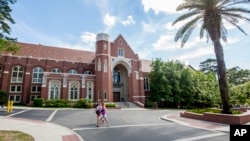Student Union
- By VOA News
Understanding Financial Aid for International Students
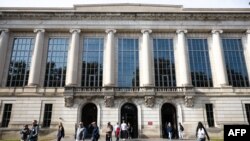
You've written your essays, submitted your grades and test scores and finally -- finally! -- earned admission to a U.S. college or university.
Now comes the really tricky part: Paying for it.
US News & World Report offers a crash course on financial aid for international students here. (December 2023)
- By VOA News
Selecting the Best Workouts for College Students

If the dormitory vending machine and a rough class schedule are conspiring to add extra pounds, students might consider a workout routine to stay trim and beat stress.
But which workout is best? Fitness instructor Sam Stahl offers some suggestions in Health Tech Zone.
- By VOA News
Study: Male College Students Less Likely to Seek Counseling
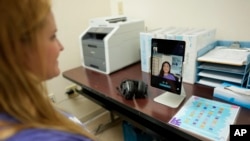
From the stress of exams to the pressures of financial obligations, the mental health of college students has become a major issue over the last few years.
But not everyone asks for help. As Vanessa McCray reports in the Atlanta Journal-Constitution, male undergraduate students are less likely than females to seek help for mental health concerns. (December 2023)
- By VOA News
‘Countries of Concern’: Florida Law Raises Questions About Student Recruitment From China
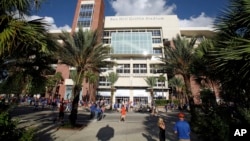
A new Florida law restricts public universities and colleges from taking money or engaging in partnerships with seven “countries of concern.”
Education officials are unsure if the law will affect recruitment of students from China – one of those countries and the largest source of international students at the University of Florida.
Writing for The New York Times, Amy Qin explains how the law, which aims to prevent the Chinese Communist Party from having influence in the state, could have unintended consequences. (December 2023)
- By VOA News
STEM Offers Partnership Opportunities for US, India

With a global demand in STEM fields – science, technology, engineering and math – opportunities exist for partnerships between the United States and India, according to consultant Akhlesh Lakhtakia.
In a Jagran Josh article, Lakhtakia explains how university partnerships can benefit both countries. (December 2023)
- By VOA News
NY State Could Increase Financial Aid for Thousands of Students

Under New York’s largest student aid program, those making under $80,000 are eligible for funds. Given recent inflation and the high cost of living in the state, some lawmakers want to raise the cap to $110,000. Jessica Blake has the story for Inside Higher Ed. (December 2023): [[ ]]
- By VOA News
International Students Discuss Life on Ohio Campus
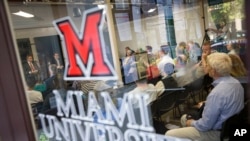
International students at Miami University in Ohio reflect on their experiences at the school in an article in The Miami Student, the student newspaper.
"In America, I think most people are really friendly compared to Japan," said Eiko Ishiyama, a student from Japan. "When you make eye contact with Americans on the street, they just smile at you. In Japan, we don’t smile at all, even if we make eye contact."
Read the full story here. (December 2023)
- By VOA News
Robotic Dog Could Soon Guard Colleges

The firm Ghost Robotics has developed a cybernetic dog that can run at 11 kph, swim and launch drones. Colleges worry that this security solution would be excessive and "Orwellian."
Taylor Swaak reports for the Chronicle of Higher Education. (December 2023)
- By VOA News
International Student Athletes Ponder Life at Penn
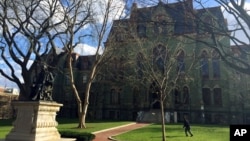
International student-athletes talk about the diverse paths that led them to the University of Pennsylvania in this article from the student newspaper.
"What motivated me is the team chemistry and the team culture here," Omar Hafez, a squash player from Egypt, told The Daily Pennsylvanian. Read the full story here. (December 2023)
- By VOA News
Inside the ‘Revolt’ When Yale Law Left the Most Important Rankings

Last year, Yale Law School, traditionally ranked No. 1 by the influential US News & World Report, announced it would no longer participate. Other law schools faced a difficult choice – leave en masse with Yale or reap the benefits as a competitor left the field.
Jack Stripling of The Washington Post investigates their covert struggle with the rankings and one another. (December 2023) [[ ]]
COVID-19 Effects Linger Among International Students in US
The COVID-19 pandemic affected students around the world, disrupting their studies and weakening their social skills. But the pandemic did generate some positive outcomes, say college counselors and international students who are back to in-person learning in the United States. VOA’s Laurel Bowman explores. Camera: Adam Greenbaum and Saqib Ul Islam.
- By VOA News
How to Fill Out This Year’s US Financial Aid Form
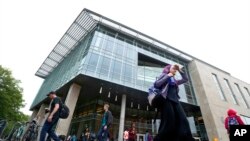
Students in the United States usually fill out the Free Application for Federal Student Aid, or FAFSA, once a year. The form determines your eligibility for scholarships and need-based aid.
Next year’s FAFSA has changed in some important ways; Sarah Wood of the US News & World Report explains. (December 2023)
- By VOA News
Angolan Student Hopes to Use Education to Help Homeland
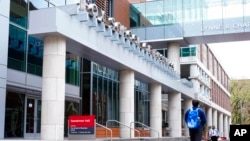
Antonio Matias Buenga, a student from Angola enrolled at Temple University in Philadelphia, Pennsylvania, is studying nursing, hoping to return to Africa to help people there.
"The only way to solve the challenges facing Africa is through education. In Angola, many people quit school to get a job and support their families. Marriage at a young age is common. I wanted to prioritize my education. In the U.S., the greatest opportunity I have is learning,: he says. Read the full story here. (November 2023)
Chinese Students, Universities Struggle to Understand Impact of New Florida Law
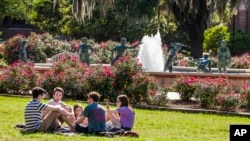
Students and faculty alike at universities in Florida are still unsure about the impact of a new state law restricting cooperation between the institutions and their counterparts in China and a handful of other countries six months after it went into effect.
"Some people only found out about this after seeing news reported in China, and no one knew how the law would actually be implemented," said Zhang, a graduate who told VOA the law has caused anxiety and uneasiness among Chinese students she knows.
Zhang, who earned a Ph.D. from the University of Florida two years ago, asked that VOA not reveal her full name for fear of retaliation from the Chinese government.
She said she knows two students who are still studying at the university but worry whether they can continue to work as teaching assistants for an annual income of $20,000 to $30,000.
The law, known as the Agreements of Educational Entities with Foreign Entities Act, or SB 864, bars state colleges and universities in Florida and their employees and representatives from accepting any gifts "in their official capacities from a college or university" based in any of seven "countries of concern": China, Russia, Iran, North Korea, Cuba, Venezuela and Syria.
Twelve state colleges and universities are also prohibited from accepting any grant from or participating in any agreement or partnership with any college or university based in any of the seven countries unless the partnership is authorized by the Florida Board of Governors or the State Board of Education, according to a May news release from the governor's office.
"Florida is taking action to stand against the United States' greatest geopolitical threat — the Chinese Communist Party [CCP]," Governor Ron DeSantis said in the statement, adding that the purpose of the bill is to stop CCP influence in the state's education system from grade school to grad school.
In a letter to its faculty on December 15, the Department of Physics at the University of Florida interpreted the law as saying "that for the 2024-25 academic year, we are not able to offer 'employment' — meaning any form of assistantship or fellowship support — to students in those countries."
"Although the law may potentially allow us to admit self-funded students, that question is not yet clearly answered. In any case, [the Department of] Physics always offers financial support to its admitted grad students. Therefore, for all practical purposes, we will not be able to offer admission to students applying from those countries."
The school may be able to offer admission and assistantship to students who originate from the seven countries but who are already living and studying in the U.S. But "these cases will have to be individually reviewed and approved by the [University of Florida] administration before any offer is made."
The letter also pointed out that the "already in the U.S." exception cannot be a back door for recruiting students from the seven countries by bringing them into the U.S. by some other means, and then offering them a graduate assistantship once they are here.
The letter noted that faculty hired under an H-1B visa are not affected.
VOA reached out to the governor's office and State Senator Bryan Avila's office seeking comments on how the state's competitiveness in education might be affected, the potential for discrimination against Chinese Americans, and any plans the state has to protect Chinese Americans from such discrimination. By the time of publication, VOA had received no response from either office.
"Not all Chinese students serve the Communist Party," Zhang told VOA. "Many of them left because they didn't like China."
When she was an undergraduate student in Beijing, Zhang said, she was disgusted by the political and ideological courses related to Mao Zedong, Deng Xiaoping and Marxism-Leninism. She hated the patriotic slogans and student activities that promoted the Communist Party.
She also followed politically sensitive topics including the Tiananmen Massacre, she said, adding that she wanted to leave China even when she was still a freshman.
Zhang believes many Chinese students come to the U.S. because they want a freer and more open academic environment than that in China, and they want to live and work in — as well as contribute to — the U.S. She said these students should not be seen as a threat to the security of the U.S. just because of their nationality.
Li Chenglong, a professor at the College of Pharmacy at the University of Florida, told VOA that Chinese students are an important part of the doctoral student body there. "Because of this bad policy right now damaging the UF reputation, I am speculating that maybe in future years, maybe there will be less [Chinese] applications to UF," he said.
Richard Woodard, professor of physics at the University of Florida, told VOA, "The law saddens me because the Chinese used to comprise a third of our graduate students, and they were the best."
According to 2020 data, the University of Florida had 344 undergraduates and 1,110 graduate and doctoral students from China, more than from any other foreign country. In 2023, the data show, the university's optical engineering and computer science departments alone had 508 Chinese graduate students and doctoral students.
Woodard thinks the concern about threats from China is valid, "but I do wish we could have found some other way of addressing security concerns."
He said, "It takes years of dedicated study to pursue a career in physics. I don't think it would be easy for a Chinese spy to fake that, so I believe we could probably separate the potential security risks from the much larger pool of people who love physics and have the talent and training to contribute to it.
"So many American universities are under the same pressure that we might be able to create a vetting service in cooperation with American intelligence agencies."
Jon Taylor, chair of the Department of Political Science and Geography at the University of Texas at San Antonio, also acknowledged that China has tried in the past to exploit America's open education system. But he too thinks the new law is overly broad.
"There are concerns about spying and intellectual property issues, those things happen, we know they happen," he said. "And everybody has to do their due diligence, but I think what Florida is doing goes beyond due diligence."
He called the Florida bill "shooting itself in the foot" as China's state media have used it as a tool to criticize the U.S.
- By VOA News
International Students Are Worth $38 Billion to the US Economy
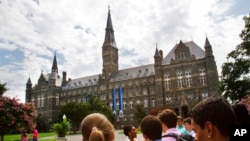
International students attending U.S. colleges and universities contribute nearly $38 billion to the U.S. economy, according to the U.S. Department of Commerce.
The U.S. Department of State, citing research from the Institute for International Education, also said 338,000 American jobs depend on students from other countries.
See the highlights and the data for yourself in this press release from the State Department. (November 2023)






